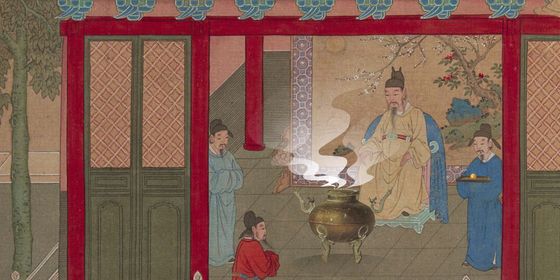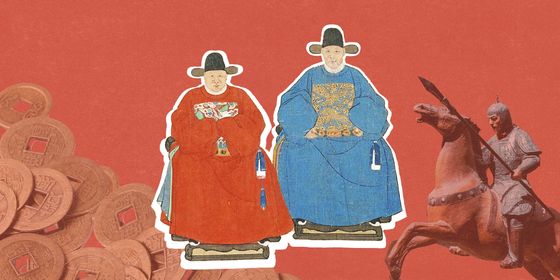From Wu Zetian to Emperor Yongzheng, China’s imperial rulers were obsessed with people conspiring against the throne and came up with various systems to encourage informers
One day in 684, a group of imperial guards gathered in China’s then-capital Luoyang for a drink. They had no idea that most of them would be dead soon.
The political situation at the time was tense. Empress Dowager Wu Zetian had recently deposed Emperor Zhongzong of the Tang dynasty (618 – 907) and installed her youngest son on the throne. The guards discussed politics, with one of them allegedly saying: “If I had known that there would be no reward for my contribution, I would rather serve Emperor Zhongzong.”
Before they had finished their dinner, all but one of the guards were captured and thrown into prison. The one who apparently uttered the disloyal remark was beheaded, while the others were hanged just for being present. The informer among their ranks, who had secretly slipped out halfway through the meeting, was rewarded for snitching with a promotion. The incident was recorded in Song dynasty (960 – 1279) historian Sima Guang’s (司马光) Comprehensive Mirror for Aid in Government (《资治通鉴》), with the legendary chronicler remarking that the incident “set off the trend of informing on others.”
According to Sima Guang, Wu’s reign was indeed marked by snitching, which was actively encouraged by the empress and her regime. Informants were provided with horses and safe passage to the imperial court, where they would receive food and drink comparable to what high-ranking officials typically enjoyed. If the information they provided was proven, they would be promoted; if it was false, they wouldn’t be punished. “Informants from all directions emerged in droves, and people held their breath in fear,” Sima Guang wrote. Of course, this also brought a torrent of fake information, but with her grip on power still shaky, Empress Wu considered it a price worth paying to get information from across the country.
Systems for informing against others were around long before Wu though. As early as in the Warring States period (475 – 221 BCE), the State of Qin established a system which organized society into units of five or ten households. The law required people within each unit to supervise and report on each other. If they refused to report a crime in their unit, every person in the unit would be killed by being cut in half at the waist.
During the Han dynasty (206 BCE – 220 CE), informants were encouraged to report tax evasion. Emperor Wu of Han (no relation to Wu Zetian) had instituted a property tax to fund his wars against the Xiongnu tribes to the west and north of the empire, but merchants keen to avoid the levy began to hide their wealth. A decree in 117 BCE encouraged people to report tax evaders by promising to give half the seized wealth to the informer as a reward. The Book of Han (《汉书》) recorded that “almost all middle and upper class households were reported,” and the government confiscated immense amounts of silver and coins, tens of millions of slaves, and a large amount of land. Though the measure helped the government raise money in a short term, many merchants went bankrupt, people refused to save money lest it be confiscated, and industry and commerce struggled to develop.
Informing could, however, help reveal serious corruption in government. Also during the Han dynasty, official Zhao Guanghan (赵广汉) invented the 缿筒 (xiangtong), a box with just one small opening at the top for citizens to post their complaints and no way for anyone other than the official with the key to get them out. It was much like a piggy bank today. Zhao used his new invention to fight against corrupt officials and the local clans that colluded with them in Yingchuan, a region in today’s Henan province, where he worked.
Empress Wu Zetian reprised a similar secret box during her reign when official Yu Baojia (鱼保家) suggested using a bronze receptacle with four compartments, each with a tiny opening on top to collect anonymous tip-offs about misbehavior. Four boxes were cast, painted different colors for different types of reports, and placed on each side of the imperial court. A black one located on the north side of the court and reserved for reports of conspiracy (and observations of celestial phenomena) quickly became a tool for officials to attack their political enemies. Even Yu, who helped establish the informing system, was not immune. He was quickly accused of making weapons for a rebel leader and executed.
Secret systems of communication persisted into the Qing dynasty (1616 – 1911) when emperors used secret memorials to collect information, including accusations against government officials. In the reigns of Emperor Kangxi and Emperor Yongzheng, the ruler would give out specially designed lockboxes to favored officials so they could submit secret notes directly to the emperor. There were only two keys to the lockbox: one for the emperor, and the other for the official. The supposed security of this communication system made it an important channel for information exchange between the emperor and his most trusted subjects. According to historian Yang Qiqiao’s 20th-century book Emperor Yongzheng and His Secret Memorials System, Emperor Yongzheng received over 22,000 secret memorials during his 13-year reign.
Secret memorials, along with other systems of informing and passing secret information, served the rulers of the day, but they were often despised. Many people were undoubtedly executed for crimes they didn’t commit, while others were forced to make up stories about others to save their own skin.
Wei Xuantong (魏玄同), Prime Minister for part of Wu Zetian’s reign, was one who refused to accuse his peers. When Wei was in his 70s, a political rival falsely accused him of disloyalty, and he was sentenced to death. A colleague suggested Wei make up a report on someone else so that he could gain an audience with Empress Wu and defend himself. But Wei refused, uttering what has since become a famous quote against informers: “What’s the difference between being killed by a ghost or by a person? How could I be an informant?” Soon after, he was executed.













